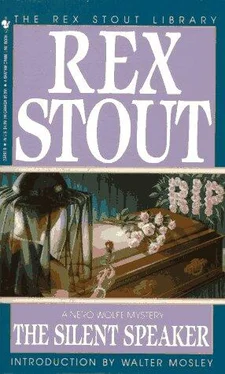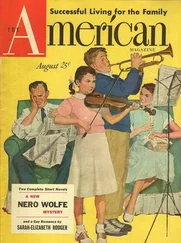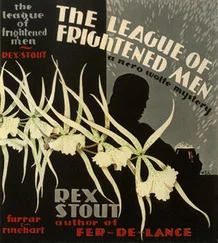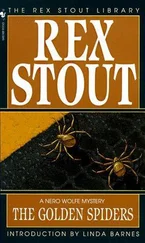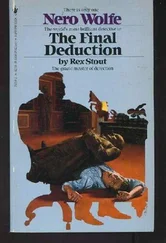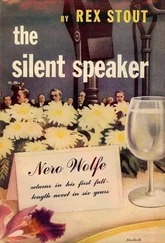Rex Stout - The Silent Speaker (Crime Line)
Здесь есть возможность читать онлайн «Rex Stout - The Silent Speaker (Crime Line)» весь текст электронной книги совершенно бесплатно (целиком полную версию без сокращений). В некоторых случаях можно слушать аудио, скачать через торрент в формате fb2 и присутствует краткое содержание. Жанр: Старинная литература, en-GB. Описание произведения, (предисловие) а так же отзывы посетителей доступны на портале библиотеки ЛибКат.
- Название:The Silent Speaker (Crime Line)
- Автор:
- Жанр:
- Год:неизвестен
- ISBN:нет данных
- Рейтинг книги:5 / 5. Голосов: 1
-
Избранное:Добавить в избранное
- Отзывы:
-
Ваша оценка:
- 100
- 1
- 2
- 3
- 4
- 5
The Silent Speaker (Crime Line): краткое содержание, описание и аннотация
Предлагаем к чтению аннотацию, описание, краткое содержание или предисловие (зависит от того, что написал сам автор книги «The Silent Speaker (Crime Line)»). Если вы не нашли необходимую информацию о книге — напишите в комментариях, мы постараемся отыскать её.
The Silent Speaker (Crime Line) — читать онлайн бесплатно полную книгу (весь текст) целиком
Ниже представлен текст книги, разбитый по страницам. Система сохранения места последней прочитанной страницы, позволяет с удобством читать онлайн бесплатно книгу «The Silent Speaker (Crime Line)», без необходимости каждый раз заново искать на чём Вы остановились. Поставьте закладку, и сможете в любой момент перейти на страницу, на которой закончили чтение.
Интервал:
Закладка:
Chapter 6
I CALLED IT OPERATION Payroll. That name for the preliminary project, the horning-in campaign, was not, I admit, strictly accurate. In addition to the salaries of Fritz Brenner, Charley the cleaning man, Theodore Horstmann the orchid tender, and me, the treasury had to provide for other items too numerous to mention. But on the principle of putting first things first, I called it Operation Payroll.
It was Friday morning before we caught the fish we were after. All that happened Thursday afternoon was a couple of unannounced visits, one from Cramer and one from G. G. Spero, and Wolfe had told me not to let them in, so they went away without crossing the sill. To show how sure I felt that the fish would sooner or later bite. I took the trouble Thursday afternoon and evening to get up a typed report of the Boone case as I knew it, from newspaper accounts and a talk I had had Wednesday with Sergeant Purley Stebbins. I’ve just read that report over again and decided not to copy it all down here but only hit the high spots.
Cheney Boone, Director of the government’s Bureau of Price Regulation, had been invited to make the main speech at a dinner of the National Industrial Association on Tuesday evening at the Grand Ballroom of the Waldorf-Astoria. He had arrived at ten minutes to seven, before the fourteen hundred guests had gone to their tables, while everyone was still milling around drinking and talking. Taken to the reception room reserved for guests of honor, which as usual was filled with over a hundred people, most of whom weren’t supposed to be there, Boone, after drinking a cocktail and undergoing a quantity of greetings and introductions, had asked for a private spot where he could look over his speech, and had been taken to a small room just off the stage. His wife, who had come with him to the dinner, had stayed in the reception room. His niece, Nina Boone, had gone along to the private spot to help with the speech if required, but he had almost immediately sent her back to the reception room to get herself another cocktail and she had remained there.
Shortly after Boone and his niece had departed for the murder room, as the papers called it, Phoebe Gunther had showed up. Miss Gunther was Boone’s confidential secretary, and she had with her two can openers, two monkey wrenches, two shirts (men’s), two fountain pens, and a baby carriage. These were to be used as exhibits by Boone for illustrating points in his speech, and Miss Gunther wanted to get them to him at once, so she was escorted to the murder room, the escort, a member of the NIA, wheeling the baby carriage, which contained the other items, to the astonished amusement of the multitude as they passed through. Miss Gunther remained with Boone only a couple of minutes, delivering the exhibits, and then returned to the reception room for a cocktail. She reported that Boone had said he wanted to be alone.
At seven-thirty everybody in the reception room was herded out to the ballroom, to find their places on the dais and at the tables, where the fourteen hundred were settling down and the waiters were ready to hurl themselves into the fray. About seven forty-five Mr. Alger Kates arrived. He was from the Research Department of the BPR, and he had some last-minute statistics which were to be used in Boone’s speech. He came to the dais looking for Boone, and Mr. Frank Thomas Erskine, the President of NIA, had told a waiter to show him where Boone was. The waiter had led him through the door to backstage and pointed to the door of the murder room.
Alger Kates had discovered the body. It was on the floor, the head battered with one of the monkey wrenches, which was lying nearby. The implication of what Kates did next had been hinted at in some newspapers, and openly stated in others: namely, that no BPR man would trust any NIA man in connection with anything whatever, including murder. Anyhow, instead of returning to the ballroom and the dais to impart the news, Kates had looked around backstage until he found a phone, called the hotel manager, and told him to come at once and bring all the policemen he could find.
By Thursday evening, forty-eight hours after the event, something like a thousand other details had been accumulated, as for instance that nothing but smudges were found on the handle of the monkey wrench, no identifiable prints, and so forth and so forth, but that was the main picture as it had been painted when I was typing my report.
Chapter 7
FRIDAY WE GOT THE bite. Since Wolfe spends every morning from nine to eleven up in the plant rooms, I was in the office alone when the call came. The call took the regular routine in this Land of the Secretary.
“Miss Harding calling Mr. Wolfe. Put Mr. Wolfe on, please.”
If I put it all down it would take half a page to get me, not Mr. Wolfe, just me, connected with Miss Harding. Anyhow I made it, and got the idea across that Wolfe was engaged with orchids and I would have to do. She wanted to know how soon Wolfe could get up there to see Mr. Erskine, and I explained that he seldom left the house for any purpose whatever, and never merely on business.
“I know that!” she snapped. She must have missed another night’s sleep. “But this is Mr. Erskine! ”
I knew we had him now, so I snooted her. “To you,” I agreed, “he is all of that. To Mr. Wolfe he is nothing but a pest. Mr. Wolfe hates to work, even at home.”
Instructed to hold the wire, I did so, for about ten minutes. Finally her voice came again:
“Mr. Goodwin?”
“Still here. Older and wiser, but still here.”
“Mr. Erskine will be at Mr. Wolfe’s office at four-thirty this afternoon.”
I was getting exasperated. “Listen, Public Relations,” I demanded, “why don’t you simplify it by connecting me with this Erksine? If he comes at four-thirty he’ll wait an hour and a half. Mr. Wolfe’s hours with orchids are from nine to eleven in the morning and from four to six in the afternoon, and nothing short of murder-I mean nothing-has ever changed it or ever will.”
“That’s ridiculous!”
“Sure it is. So is this ring-around-the-rosy method for a man communicating with another man, but I stand for it.”
“Hold the wire.”
I never got connected with Erskine, that was too much to expect, but in spite of everything we finally completed an arrangement, fighting our way through the obstacles, so that when Wolfe come downstairs at eleven o’clock I was able to announce to him:
“Mr. Frank Thomas Erskine, President of the National Industrial Association, with outriders, will be here at ten minutes past three.”
“Satisfactory, Archie,” he muttered.
Frankly, I wish I could make my heart quit doing an extra thump when Wolfe says satisfactory, Archie. It’s childish.
Chapter 8
WHEN THE DOORBELL RANG that afternoon right on the dot at three-ten and I left my chair to answer it, I remarked to Wolfe:
“These people are apt to be the kind that you often walk out on or, even worse, tell me to eject. It may be necessary to control yourself. Remember the payroll. There is much at stake. Remember Fritz, Theodore, Charley, and me.”
He didn’t even grunt.
The catch was above expectations, for in the delegation of four we got not one Erskine but two. Father and son. Father was maybe sixty and struck me as not imposing. He was tall and bony and narrow, wearing a dark blue ready-made that didn’t fit, and didn’t have false teeth but talked as if he had. He handled the introductions, first himself and then the others. Son was named Edward Frank and addressed as Ed. The other two, certified as members of the NIA Executive Committee, were Mr. Breslow and Mr. Winterhoff. Breslow looked as if he had been born flushed with anger and would die, when the time came, in character. If it had not been beneath the dignity of a member of the NIA Executive Committee, Winterhoff could have snagged a fee posing as a Man of Distinction for a whisky ad. He even had the little gray mustache.
Читать дальшеИнтервал:
Закладка:
Похожие книги на «The Silent Speaker (Crime Line)»
Представляем Вашему вниманию похожие книги на «The Silent Speaker (Crime Line)» списком для выбора. Мы отобрали схожую по названию и смыслу литературу в надежде предоставить читателям больше вариантов отыскать новые, интересные, ещё непрочитанные произведения.
Обсуждение, отзывы о книге «The Silent Speaker (Crime Line)» и просто собственные мнения читателей. Оставьте ваши комментарии, напишите, что Вы думаете о произведении, его смысле или главных героях. Укажите что конкретно понравилось, а что нет, и почему Вы так считаете.
